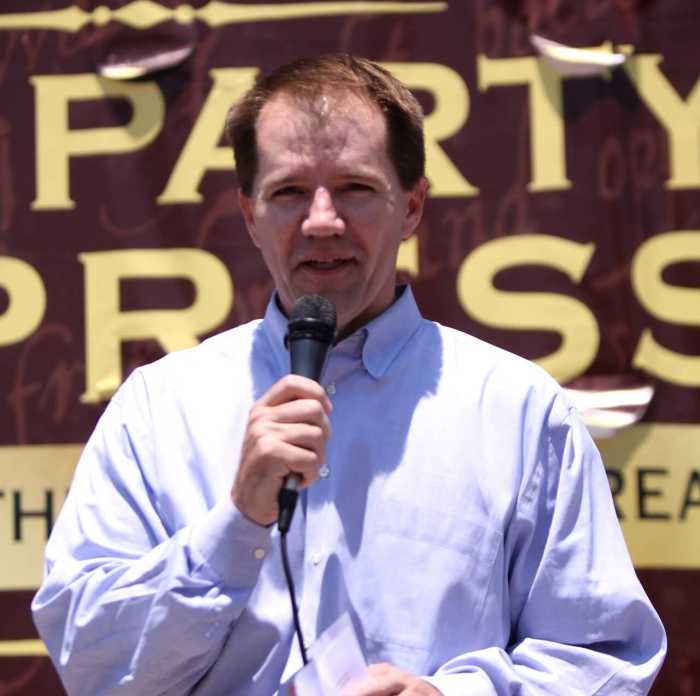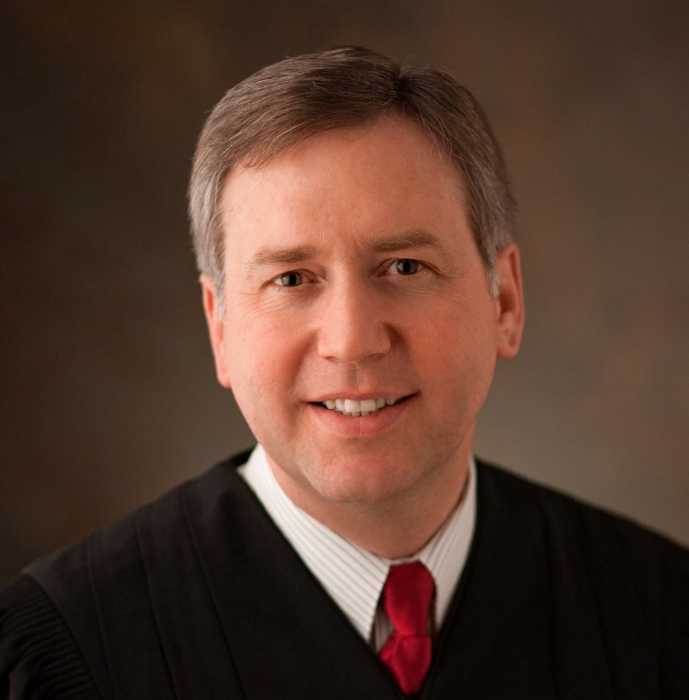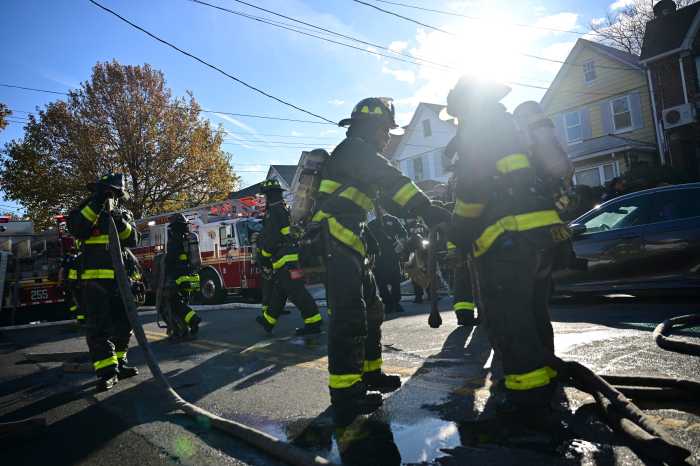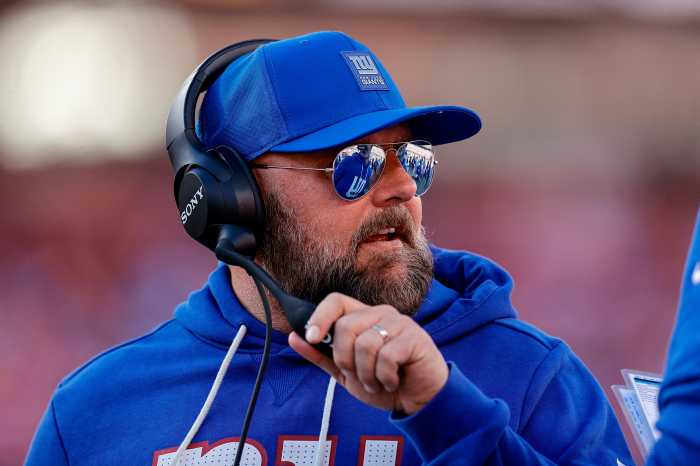Joshua Payne-Elliott taught languages and social studies at Cathedral Catholic High School in Indianapolis from 2006 until he was fired in 2019 under pressure from the Roman Catholic Archdiocese of Indianapolis because he married a man. Payne-Elliott sued the Archdiocese for intentional interference with his employment contract. On August 31, the Supreme Court of Indiana, reversing a ruling by the state’s court of appeals, ordered that Payne-Elliott’s lawsuit be dismissed under the “church-autonomy doctrine.”
Cathedral Catholic High School is neither owned nor operated by the Archdiocese of Indianapolis, but rather by the Brothers of Holy Cross. Payne-Elliott was employed on a year-to-year contract, which had been renewed for the 2019-2020 school year in May of 2019. His written contract committed him to comply with Catholic church doctrine. Payne-Elliott’s husband is a teacher at Brebeuf Jesuit Preparatory School.
After Payne-Elliott and his husband married in 2017, the Archdiocese contacted both schools, directing them to discharge the two men. At first neither school followed this directive, instead initiating dialogue with the Archdiocese, but eventually the recently-installed Archbishop Charles C. Thompson lost patience and told both schools that they would no longer be recognized by the church as Catholic schools if they continued to employ these gay married teachers.
In June of 2019, Brebeuf announced that it had declined the Archdiocese’s directive that it fire Payne-Elliott’s husband “due to the teacher being a spouse within a civilly-recognized same-sex marriage.” The Jesuits tend to be more independent from the church than other Catholic religious orders. The next day, Archbishop Thompson issued a “decree” stating that Brebeuf was no longer recognized as a Catholic school by the Archdiocese, stating that it could “no longer use the name Catholic” and would be removed from listing in the “Official Catholic Directory.” Thompson cited his “canonical responsibility to oversee faith and morals as related to Catholic identity within the Archdiocese of Indianapolis” and that Brebeuf “had chosen not to implement changes in accord with the doctrine and pastoral practice of the Catholic Church.”
Evidently this action convinced Cathedral’s administration that the Archdiocese was serious about its threat. On June 23, 2019, Cathedral’s president informed Payne-Elliot that his employment was terminated, even though he had a contract to teach there for the 2019-20 academic year. Cathedral posted a letter to “the Cathedral Family” on its website stating that “after 22 months of earnest discussion and extensive dialogue” with the Archdiocese, “Archbishop Thompson made it clear that Cathedral’s continued employment of a teacher in a public, same-sex marriage would result in our forfeiting our Catholic identity due to our employment of an individual living in contradiction to Catholic teaching on marriage.”
Payne-Elliott’s attorney wrote to Cathedral, threatening to sue for breach of contract. Cathedral quickly reached a settlement with Payne-Elliott for an undisclosed amount.
The Archdiocese knew about the contract renewal, since it had been in talks with Cathedral for almost two years urging that Payne-Elliott be fired. Payne-Elliott sued the Archdiocese for the tort of intentional interference with his contract and his employment relationship with Cathedral.
The Archdiocese moved to dismiss the case, citing three defenses to Payne-Elliott’s claim: the ministerial exception, freedom of expressive association, and the church autonomy doctrine. The trial court dismissed the case, finding that it lacked jurisdiction over this dispute, but the court of appeals reversed and sent the case back to the Marion Superior Court. According to the court of appeals’ 2021 ruling, the Archdiocese could be sued for the tort of intentional interference with contractual rights, and its claim of constitutional protection did not deprive the trial court of jurisdiction to hear Payne-Elliott’s tort claim.
The Archdiocese filed a motion asking the Indiana Supreme Court to order dismissal of the case, and that court granted the motion in an opinion by Justice Geoffrey Slaughter, who had been appointed to the court by then-Governor Mike Pence in May 2016, shortly before Pence resigned as governor to run for vice president with Donald Trump. One member of the court, Justice Mark Massa, concurred with Slaughter’s opinion. Two members, Christopher Goff and Steven David, concurred “in the judgment” without necessarily endorsing Slaughter’s reasoning. Chief Justice Loretta Rush did not “participate” in deciding the case.
Under the ministerial exception, as recognized under the First Amendment by the US Supreme Court, a religious institution may not be sued about its employment decisions concerning its ministerial employees. This arguably would not apply in this case, because Payne-Elliott was not an employee of the Archdiocese, and was not suing the Archdiocese for breach of his employment contract, as it was not a party to that contract. Also, at this stage of the case it could be unclear whether Payne-Elliott, who taught only secular subjects, would be considered a ministerial employee.
The US Supreme Court also recognizes under the First Amendment the freedom of individuals and organizations to decide with whom they will associate for expressive purposes, but this doctrine arguably might not apply to the case, because Payne-Elliott and the Archdiocese were not formally associated, as he was an employee of Cathedral, an independent entity.
Without explaining any of this, however, Justice Slaughter stated that the Complaint by Payne-Elliott “has pleaded all elements of the archdiocese’s church-autonomy defense,” so the defendant was entitled to dismissal on that ground and “we need not pass on its other two defenses.”
The Indiana Supreme Court recognized the “church-autonomy doctrine” in 2003 in the analogous case of Brazaukas v. Fort Wayne-South Bend Diocese, Inc. In that case, the plaintiff sued the diocese for interfering with her attempt to get a job at Notre Dame University by informing Notre Dame’s president that she had a lawsuit going on against the diocese. The court explained that this doctrine “deals with a church’s First Amendment right to autonomy in ‘making decisions regarding its own internal affairs,’ including matters of faith, doctrine, and internal governance.”
The court acknowledged in the Brazauskas case that this doctrine was not “unlimited,” and that “criminal conduct is not protected by the church-autonomy doctrine — even if carried out using communications about church doctrine or policy.” Summarizing, the court said that “Brazauskas teaches that under the church-autonomy doctrine a civil court may not (1) penalize via tort law (2) a communication or coordination among church officials or members (3) on a matter of internal church policy or administration that (4) does not culminate in a criminal act.”
Slaughter concluded that this analysis applied to Payne-Elliot’s tort claim against the archdiocese, because it was based on a communication by the Archdiocese to Cathedral that Cathedral could not both employ Payne-Elliott and remain recognized as a Catholic school. “The complaint and attachments show the directive was, like the one to Brebeuf, a choice the archdiocese gave Cathedral. It could either retain its recognition as a Catholic school or forfeit continued recognition. This choice reflects the archdiocese’s authority to declare which schools are Catholic,” consistent with First Amendment precedents barring the government interfering with the autonomy of religious bodies to determine questions of religious faith and practice.
The court concluded that although the trial court had jurisdiction of this tort claim, it was appropriate to dismiss it because the church-autonomy doctrine “bars Payne-Elliott’s claims.”
Justices David and Goff did not issue an opinion explaining why they concurred in the judgment but not in Justice Slaughter’s opinion. Justice David’s term on the court actually expired at the end of the day on August 31.
Thus, Justice Slaughter’s decision to base this dismissal solely on the church-autonomy doctrine speaks only for himself and Justice Massa, not for a majority of the five-member court. No explanation is given about why Chief Justice Rush did not participate in deciding this case. Perhaps she had a conflict of interest.
As the Indiana court premises its ruling on the federal First Amendment, not on the Indiana Constitution, Payne-Elliott — who is represented by Kathleen A. DeLaney, Matthew R. Gutwein, and Christopher S. Stake, of DeLaney & DeLaney LLC, Indianapolis — could seek review from the US Supreme Court. But they would be well-advised not to, since this case would likely be seized upon by that court to expand the ministerial exception that it has recognized in employment disputes involving religious school teachers by adopting the Indiana Supreme Court’s broader view of “church-autonomy,” which a majority of the current Supreme Court might be eager to embrace.
The Beckett Fund for Religious Liberty, based in Washington, D.C., joined by local counsel from Indiana, represents the Archdiocese of Indianapolis.
Lambda Legal filed an amicus brief in support of Payne-Elliott’s claim. Also filing amicus briefs were a group of Indiana Constitutional Law Scholars, the Notre Dame Law School Religious Liberty Clinic, and the State of Indiana.
















